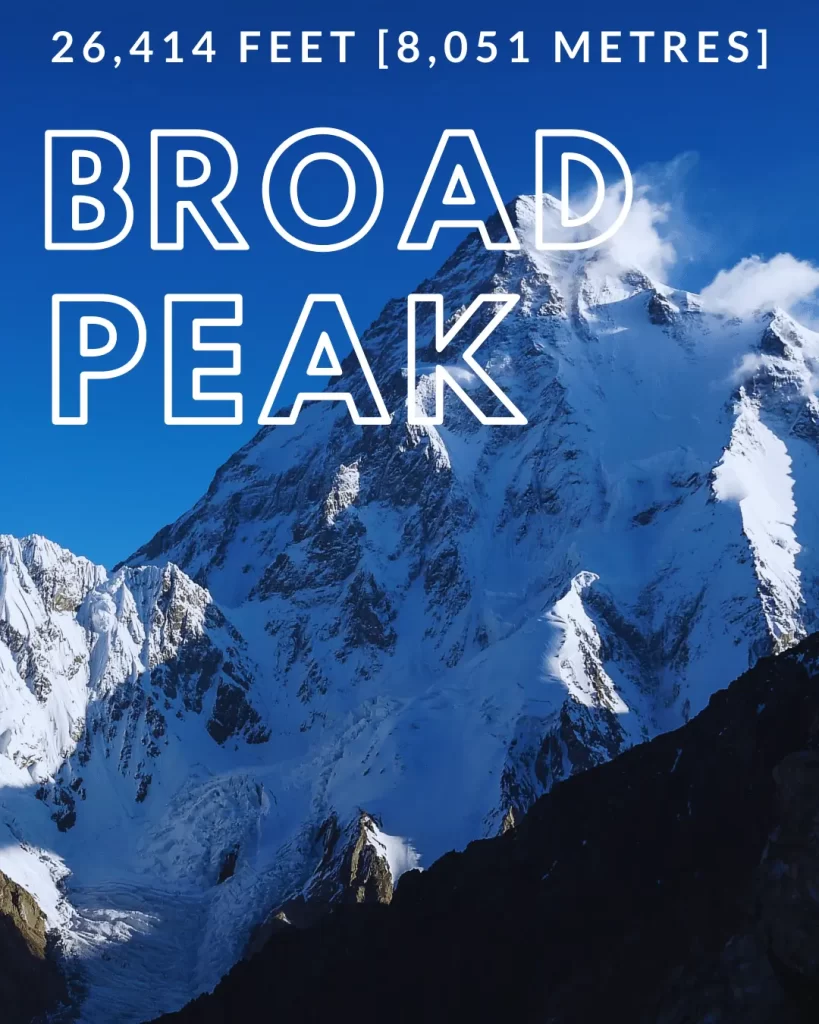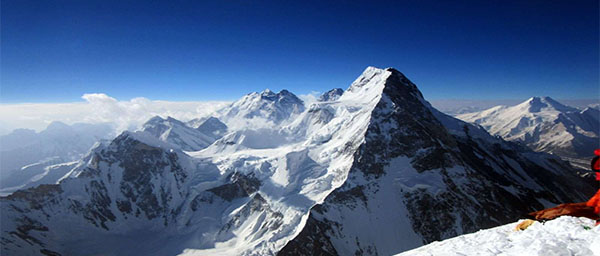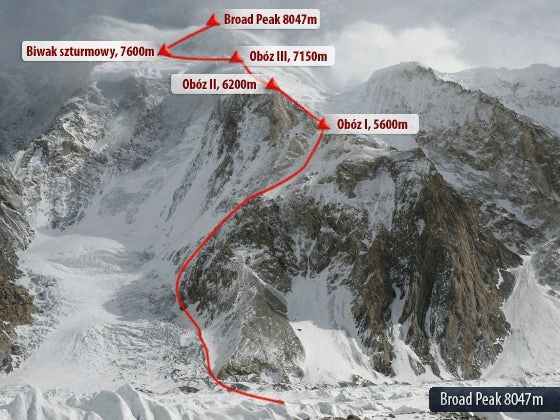Best Broad Peak Expedition Guide
This Broad Peak Expedition Guide will help you plan your initial trip phase, please contact us or other industry experts for more information.
Located in the heart of the Karakoram range in Pakistan, Broad Peak Mountain is one of the world’s tallest peaks, towering over 8,000 meters above sea level. Known for its distinctive pyramid shape and sheer beauty, Broad Peak is a challenging and awe-inspiring destination for climbers from around the world. In this article, we’ll delve into the history and geography of Broad Peak and explore what it takes to climb this iconic mountain.
History and Geography Of Broad Peak
Broad Peak was first climbed in 1957 by a team of Austrian climbers led by Marcus Schmuck. Since then, the mountain has been climbed by dozens of expeditions, each with its unique challenges and triumphs. The mountain is located on the border between Pakistan and China and is part of the larger Karakoram range, home to some of the world’s tallest peaks, including K2 and Gasherbrum.
Broad Peak’s pyramid shape and steep incline make it one of the most challenging climbs in the world, requiring technical skill, physical endurance, and a significant amount of time to summit. The mountain’s unique position adds an additional layer of complexity to the logistics of organizing an expedition.


Broad Peak Expedition

Is Broad Peak a hard climb? Climbing Broad Peak requires a significant amount of preparation and planning. Most expeditions last between six to eight weeks and involve acclimatization, base camp setup, and several stages of climbing. The most common route up the mountain is the West Ridge, which involves crossing several glaciers and steep snowfields before reaching the summit.
Due to the mountain’s high altitude and technical difficulty, climbers must be in excellent physical condition and have experience with high-altitude climbing. Expedition members must also be self-sufficient and able to operate in a remote and harsh environment.
Due to the mountain’s high altitude and technical difficulty, climbers must be in excellent physical condition and have experience with high-altitude climbing. Expedition members must also be self-sufficient and able to operate in a remote and harsh environment.
Despite the challenges, climbing Broad Peak offers a unique and awe-inspiring experience for those who are up to the challenge. From the stunning views of the Karakoram range to the sense of accomplishment that comes with summiting one of the world’s tallest peaks, climbing Broad Peak is an adventure of a lifetime. If you’re planning to climb Broad Peak, here is a guide to help you prepare and make the most of your expedition.
1. Physical Fitness: Climbing Broad Peak is physically demanding, and it’s crucial to be in good physical shape. Start training at least 6-8 months before the expedition, focusing on cardio exercises, strength training, and endurance building.
2. Technical Skills: Broad Peak is a technical climb that requires skills in rock and ice climbing, rope management, and self-rescue techniques. Attend a mountaineering course or hire a guide to train you in these skills before the expedition.
3. Gear: Having the right gear is essential for a successful expedition. Invest in quality gear, including crampons, ice axes, climbing ropes, harnesses, and a down jacket. Rent or buy a high-altitude tent, a sleeping bag rated for at least -30°C, and a backpack that can hold all your gear.
4. Permits: Climbing Broad Peak requires obtaining permits from the Pakistan government. Contact the Pakistan Alpine Club for permit information and application procedures. It is important to apply for permits well in advance, as the process can take several weeks.
5. Logistics: Arrange for transportation to Pakistan and book a hotel in Islamabad or Skardu, the two main cities closest to Broad Peak. From Skardu, you’ll need to hire a jeep or a helicopter to reach Askole, the last village accessible by vehicle before the start of the trek.
6. Acclimatization: Acclimatization is crucial for high-altitude climbing, and it’s recommended to spend at least 2-3 weeks acclimatizing before attempting to climb Broad Peak. Start with shorter treks in the surrounding mountains and gradually move up to higher altitudes. Spend several days at Base Camp (4,900 meters/16,076 feet) before moving higher.
7. Route: Broad Peak has three main routes: the normal route from the northwest ridge, the west ridge, and the south face. The northwest ridge is the most popular route, and it takes around 45-50 days to complete the expedition.
8. Base Camp: Establishing a base camp is essential for the success of the expedition. It serves as the central hub for climbers, with facilities such as a kitchen, dining tent, and communication equipment. Spend several days acclimatizing at Base Camp before moving up to higher altitudes.
9. High Camps: There are four high camps on the normal route, located at 5,900 meters (Camp 1), 6,400 meters (Camp 2), 7,400 meters (Camp 3), and 7,900 meters (Camp 4). Plan your ascent and descent strategy carefully, considering the weather conditions and your physical and mental state.
10. Summit Day: Summit day is the most challenging part of the expedition, and it requires starting early in the morning (around 1-2 am). The ascent from Camp 4 to the summit takes around 8-10 hours, and the descent takes another 6-8 hours. Stay focused, hydrate frequently, and be prepared for the extreme cold and wind.
Conclusion
Broad Peak Mountain is a true testament to the power and beauty of nature. For those who are willing to take on the challenge, climbing this iconic mountain offers a unique and unforgettable experience. From the technical skill required to the physical endurance and mental fortitude needed to succeed, climbing Broad Peak is a true test of human limits. So if you’re an experienced climber looking for your next challenge, consider adding Broad Peak to your list of must-climb peaks.